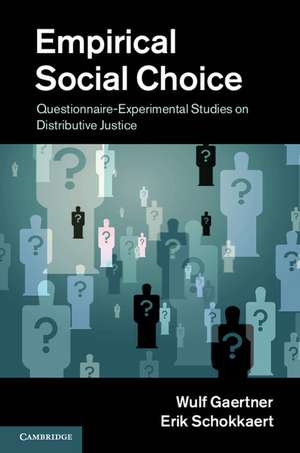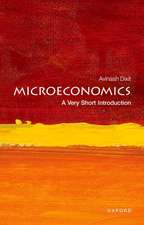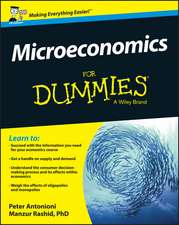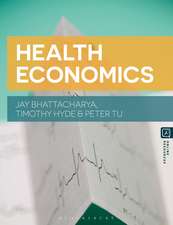Empirical Social Choice: Questionnaire-Experimental Studies on Distributive Justice
Autor Wulf Gaertner, Erik Schokkaerten Limba Engleză Hardback – 21 dec 2011
Preț: 435.67 lei
Preț vechi: 489.51 lei
-11% Nou
Puncte Express: 654
Preț estimativ în valută:
83.39€ • 90.01$ • 69.92£
83.39€ • 90.01$ • 69.92£
Carte tipărită la comandă
Livrare economică 19 aprilie-03 mai
Preluare comenzi: 021 569.72.76
Specificații
ISBN-13: 9781107013940
ISBN-10: 1107013941
Pagini: 228
Ilustrații: 6 b/w illus. 51 tables
Dimensiuni: 155 x 235 x 15 mm
Greutate: 0.48 kg
Editura: Cambridge University Press
Colecția Cambridge University Press
Locul publicării:New York, United States
ISBN-10: 1107013941
Pagini: 228
Ilustrații: 6 b/w illus. 51 tables
Dimensiuni: 155 x 235 x 15 mm
Greutate: 0.48 kg
Editura: Cambridge University Press
Colecția Cambridge University Press
Locul publicării:New York, United States
Cuprins
List of figures; List of tables; 1. Introduction; 2. Why and how?; 3. Traditional questions; 4. Fairness; 5. Fairness in health; Final remarks; References; Index.
Recenzii
'In covering a range of 'traditional' questions, the concept of fairness, ideas about fairness in health as well as issues of rationale and methodology, Gaertner and Schokkaert are to be congratulated on producing this timely companion. It is ideal for economists and psychologists setting out to do experimental studies, as well as philosophers interested in understanding how ordinary people think about a range of distributive and procedural fairness issues. An excellent overview of an emerging field the authors have done much to create.' Paul Anand, Open University, and Research Associate at HERC, Oxford University
'Empirical social choice lies at the interface between philosophy and economics and is central to the investigation of difficult normative issues. It is an important way of testing out whether approaches to value-laden issues in economics are appropriate, whether there is evidence to support elegant and theoretically attractive theories. Wulf Gaertner and Erik Schokkaert are acknowledged experts in the field and their book is an invaluable contribution to understanding this subject.' Frank Cowell, Director of the Public Economics Programme (STICERD), London School of Economics and Political Science
'On what grounds can we say that an egalitarian society is better than an inegalitarian one in which all individuals would be better off? When is an income distribution more just than another one? More generally, what is social justice? Preeminent economists such as Serge-Christophe Kolm or Amartya Sen and philosophers such as John Rawls have tried to give theoretical responses to these questions. But what about you, your relatives, your neighbours, the man in the street? In this remarkable and pioneering book, using the techniques developed within experimental economics, Wulf Gaetrner and Erik Schokkaert describe how the concepts pervading the theory of justice are perceived by 'ordinary' human beings. There is no doubt that this should have important consequences on the future development of these theoretical concepts and on public policy.' Maurice Salles, University of Caen
'Empirical Social Choice is a must-read for anyone interested in the relationship between philosophical ethics and empirical research on moral preferences. It is clearly and accessibly written, and its audience should include not only social choice theorists but also philosophers, behavioral economists, political scientists and social psychologists. Among other things, this volume includes evidence on the roles of efficiency, responsibility and need and considers applications to income, health and economic wealth, but the findings described also relate to, and sometimes even predate, important developments in experimental philosophy and behavioral economics. The authors, who are themselves among the foremost contributors to this literature, not only elucidate but also convincingly advocate for this research program.' James Konow, Loyola Marymount University, Los Angeles
'The book is well-written and accessible, making it suitable for a large number of readers. Graduate students will find the book an ideal starting point for theses on the subject, and parts of the book may be used to introduce undergraduate students to the subtleties of normative theories since they will be stimulated by how people like themselves perceive the concepts.' Social Choice and Welfare
'Empirical social choice lies at the interface between philosophy and economics and is central to the investigation of difficult normative issues. It is an important way of testing out whether approaches to value-laden issues in economics are appropriate, whether there is evidence to support elegant and theoretically attractive theories. Wulf Gaertner and Erik Schokkaert are acknowledged experts in the field and their book is an invaluable contribution to understanding this subject.' Frank Cowell, Director of the Public Economics Programme (STICERD), London School of Economics and Political Science
'On what grounds can we say that an egalitarian society is better than an inegalitarian one in which all individuals would be better off? When is an income distribution more just than another one? More generally, what is social justice? Preeminent economists such as Serge-Christophe Kolm or Amartya Sen and philosophers such as John Rawls have tried to give theoretical responses to these questions. But what about you, your relatives, your neighbours, the man in the street? In this remarkable and pioneering book, using the techniques developed within experimental economics, Wulf Gaetrner and Erik Schokkaert describe how the concepts pervading the theory of justice are perceived by 'ordinary' human beings. There is no doubt that this should have important consequences on the future development of these theoretical concepts and on public policy.' Maurice Salles, University of Caen
'Empirical Social Choice is a must-read for anyone interested in the relationship between philosophical ethics and empirical research on moral preferences. It is clearly and accessibly written, and its audience should include not only social choice theorists but also philosophers, behavioral economists, political scientists and social psychologists. Among other things, this volume includes evidence on the roles of efficiency, responsibility and need and considers applications to income, health and economic wealth, but the findings described also relate to, and sometimes even predate, important developments in experimental philosophy and behavioral economics. The authors, who are themselves among the foremost contributors to this literature, not only elucidate but also convincingly advocate for this research program.' James Konow, Loyola Marymount University, Los Angeles
'The book is well-written and accessible, making it suitable for a large number of readers. Graduate students will find the book an ideal starting point for theses on the subject, and parts of the book may be used to introduce undergraduate students to the subtleties of normative theories since they will be stimulated by how people like themselves perceive the concepts.' Social Choice and Welfare
Notă biografică
Descriere
The first self-contained analysis of the use of questionnaire data to test theories of distributive justice.








